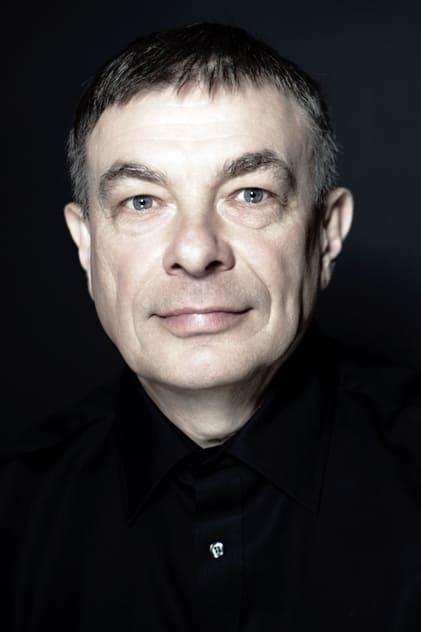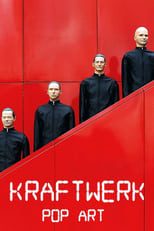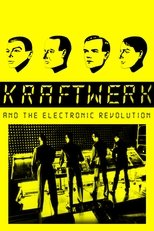

Karl Bartos
Born: May 31, 1952
in Marktschellenberg, Bayern, Germany
in Marktschellenberg, Bayern, Germany
Karl Bartos (born 31 May 1952) is a German musician and composer known for his contributions to the electronic band Kraftwerk.
Karlheinz Bartos was born on 31 May 1952 in Marktschellenberg, Germany, named after his grandfathers Karl and Heinz. He was the drummer in a college band called The Jokers (later The Jolly Jokers in 1975) as Carlos Bartos, around 1965 to 1975. Between 1975 and 1990, he was, along with Wolfgang Flür, a member of the electronic music band Kraftwerk. This lineup of the group remains the most stable and productive yet assembled. He was originally recruited to play on Kraftwerk's US "Autobahn" tour where he changed his name to "Karl", as the band member's names were displayed on stage in neon lighting; "Karlheinz" was deemed too long and thus too expensive by Kraftwerk's front man Ralf Hütter. In addition to his percussion playing, Bartos was credited with songwriting on the Man-Machine, Computer World, and Electric Café albums and sang one lead vocal on the latter.
Bartos left Kraftwerk in August 1990, reportedly frustrated at the band's slow progress in their activities due to the increasingly perfectionist attitude of founding members Ralf Hütter and Florian Schneider. Karl Bartos hinted at this fact in the interview entitled "I was a Robot", which is a part of the documentary film "Kraftwerk and the Electronic Revolution".
In 1992 Bartos founded Elektric Music. This new project released the Kraftwerk-style Esperanto in 1993, and then the more guitar-based Electric Music in 1998. In between the two albums, Bartos collaborated with Bernard Sumner and Johnny Marr on Electronic's 1996 album Raise the Pressure, and co-wrote material with Andy McCluskey of OMD, which appeared on both Esperanto and OMD's Universal album. In 1998, he also produced an album by Swedish synth-pop band the Mobile Homes, much in the style of his work with Electronic: guitar-pop with very slight synthetic references. It was received as a great disappointment to synth-pop fans, but it sold more than any of their previous albums and was used in an advert for an airline.
In 1992 Elektric Music were asked to remix Afrika Bambaataa's song "Planet Rock" for release on a remix album. Planet Rock was the subject of an out-of-court settlement between Kraftwerk and Tommy Boy Records head Tom Silverman, as it uses significant parts from both Kraftwerk's "Trans-Europe Express" and "Numbers".
In 2003, using his own name, he released the synth-pop album Communication, featuring such songs as "I'm the Message," "Camera," and "Ultraviolet."
In 2007 his music provided the soundtrack to the documentary Moebius Redux – A Life in Pictures, about the graphic artist Jean Giraud.
Karl Bartos announced in early 2008 that he had opened the first edition of the audio-visual exhibition Crosstalk for public viewing at the white cube section on the official Karl Bartos website. The program holds 21 films, remixes, cover versions, and mash-ups from Sweden, Belgium, the Netherlands, Germany, United Kingdom, the USA, and Japan.
In March 2011, Karl Bartos released Mini-Composer, an iPhone app. It's a simple 16 steps sequencer with 4 basic waves synthesizer. It has been designed with Japanese artist Masayuki Akamatsu and the executive producer is Jean-Marc Lederman.
Source: Article "Karl Bartos" from Wikipedia in English, licensed under CC-BY-SA 3.0.
Karlheinz Bartos was born on 31 May 1952 in Marktschellenberg, Germany, named after his grandfathers Karl and Heinz. He was the drummer in a college band called The Jokers (later The Jolly Jokers in 1975) as Carlos Bartos, around 1965 to 1975. Between 1975 and 1990, he was, along with Wolfgang Flür, a member of the electronic music band Kraftwerk. This lineup of the group remains the most stable and productive yet assembled. He was originally recruited to play on Kraftwerk's US "Autobahn" tour where he changed his name to "Karl", as the band member's names were displayed on stage in neon lighting; "Karlheinz" was deemed too long and thus too expensive by Kraftwerk's front man Ralf Hütter. In addition to his percussion playing, Bartos was credited with songwriting on the Man-Machine, Computer World, and Electric Café albums and sang one lead vocal on the latter.
Bartos left Kraftwerk in August 1990, reportedly frustrated at the band's slow progress in their activities due to the increasingly perfectionist attitude of founding members Ralf Hütter and Florian Schneider. Karl Bartos hinted at this fact in the interview entitled "I was a Robot", which is a part of the documentary film "Kraftwerk and the Electronic Revolution".
In 1992 Bartos founded Elektric Music. This new project released the Kraftwerk-style Esperanto in 1993, and then the more guitar-based Electric Music in 1998. In between the two albums, Bartos collaborated with Bernard Sumner and Johnny Marr on Electronic's 1996 album Raise the Pressure, and co-wrote material with Andy McCluskey of OMD, which appeared on both Esperanto and OMD's Universal album. In 1998, he also produced an album by Swedish synth-pop band the Mobile Homes, much in the style of his work with Electronic: guitar-pop with very slight synthetic references. It was received as a great disappointment to synth-pop fans, but it sold more than any of their previous albums and was used in an advert for an airline.
In 1992 Elektric Music were asked to remix Afrika Bambaataa's song "Planet Rock" for release on a remix album. Planet Rock was the subject of an out-of-court settlement between Kraftwerk and Tommy Boy Records head Tom Silverman, as it uses significant parts from both Kraftwerk's "Trans-Europe Express" and "Numbers".
In 2003, using his own name, he released the synth-pop album Communication, featuring such songs as "I'm the Message," "Camera," and "Ultraviolet."
In 2007 his music provided the soundtrack to the documentary Moebius Redux – A Life in Pictures, about the graphic artist Jean Giraud.
Karl Bartos announced in early 2008 that he had opened the first edition of the audio-visual exhibition Crosstalk for public viewing at the white cube section on the official Karl Bartos website. The program holds 21 films, remixes, cover versions, and mash-ups from Sweden, Belgium, the Netherlands, Germany, United Kingdom, the USA, and Japan.
In March 2011, Karl Bartos released Mini-Composer, an iPhone app. It's a simple 16 steps sequencer with 4 basic waves synthesizer. It has been designed with Japanese artist Masayuki Akamatsu and the executive producer is Jean-Marc Lederman.
Source: Article "Karl Bartos" from Wikipedia in English, licensed under CC-BY-SA 3.0.
Movies for Karl Bartos...

Title: Kraftwerk: Pop Art
Character: Self (archive footage)
Released: September 14, 2013
Type: Movie
This is the amazing story of how a group of reclusive Rhineland experimentalists became one of the most influential pop groups of all time - a celebration of the band featuring exclusive live tracks filmed at their Tate Modern shows in London (Feb 2013), interwoven with expert analysis, archive footage of the group, newsreel of the era and newly-shot cinematic evocations of their obsessions. With contributions from Derrick May, Holger Czukay, Francois Kevorkian, Neville Brody, Paul Morley, Peter Boettcher, Caroline Wood and more.


Title: Krautrock: The Rebirth of Germany
Character: Self (archive footage)
Released: October 22, 2009
Type: Movie
Documentary which looks at how a radical generation of musicians created a new German musical identity out of the cultural ruins of war.


Title: Kraftwerk and the Electronic Revolution
Character: Himself
Released: September 2, 2008
Type: Movie
Kraftwerk's vision of a keyboard-driven world of clicking metronomic rhythms and digitised sound bites may have been the stuff of avant fantasy in the 1970s (the decade that saw the band's first groundbreaking albums), but it is a reality in the new millennium. Their visionary style is explored in KRAFTWERK AND THE ELECTRONIC REVOLUTION, a study of the group, their career and their emergence as the most influential electronic band in the world.






Title: Midi Première
Character: Self - Kraftwerk
Released: January 6, 1975
Type: TV
Midi Première is a French variety show presented by Danièle Gilbert, directed by Jacques Pierre and broadcast from January 6, 1975 until January 1, 1982 on TF1. The program was generally broadcast between 12:15 p.m. and 12:55 p.m., then giving way to the 1:00 p.m. TV news. However, the broadcast schedule could change, depending on the guests, and the setting where the recording of the program was shot. Certain performances by artists who have become cult like the one where Ringo jostles with a demonstrator in interpretation (1977), that of Dalida with the title There is always a song with the soundtrack that does not start, twice, at the right speed (1978), Claude François and his Clodettes, who, in the provinces, are unable to join "the set" in order to interpret his song, the latter being taken by the crowd of delirious fans (summer 1977) . The group Supertramp performed there with the title "Dreamer" on March 8, 1975.
